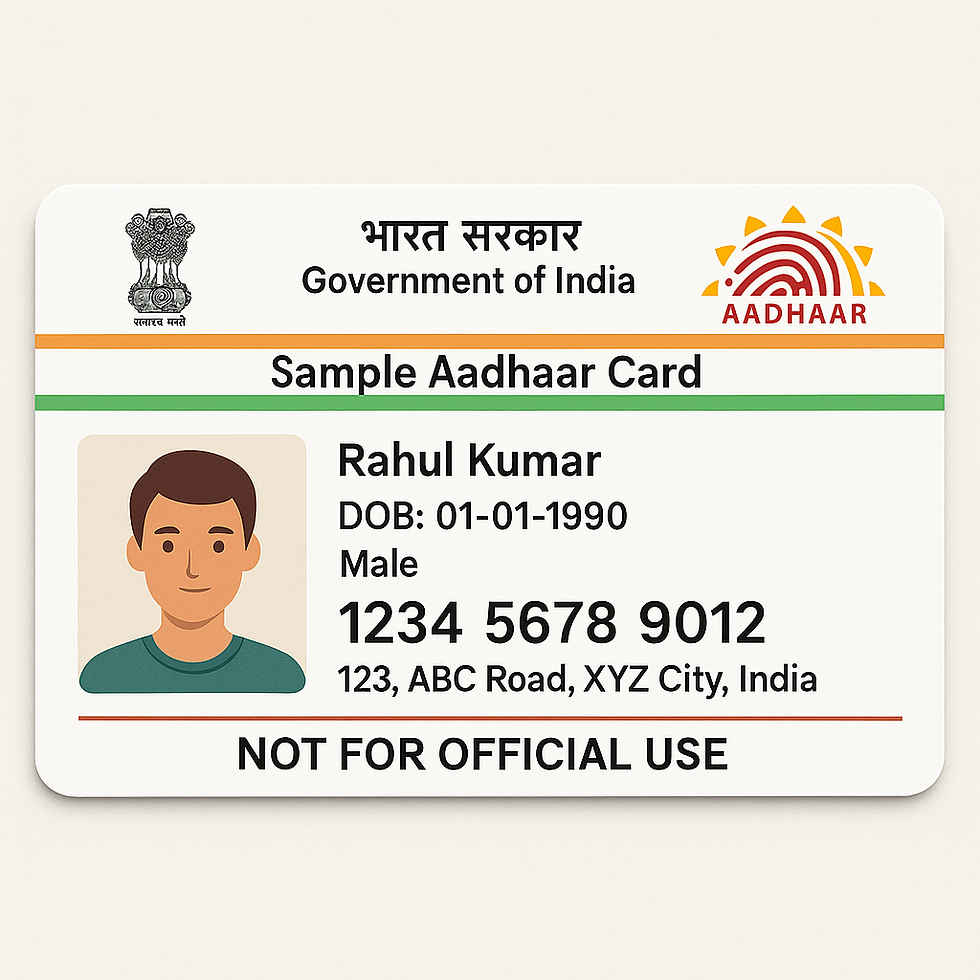Consider Aadhaar Authentications, Election ID, and Ration Card for Special Intensive Revision (SIR) Says the Supreme Court.
- Lawttorney.ai

- Jul 22, 2025
- 4 min read
Updated: Jul 29, 2025
CASE NAME: Association For Democratic Reforms & Ors. V. Election Commission of India (W.P.(C) No. 640/2025)
Introduction: India is a sovereign country with a constitution as a supreme law of land which empowers the citizens to vote and elect their representatives Under Article 326 for smoothing functions Election commission framed to regulate and conduct the elections of parliament and state legislatures , President and Vice - President.Under the Representative of peoples acts the Election Commission are authorized to conduct and maintain the electoral lists of the candidates Indian Citizens.
The Election Commission conducted the Special Intensive Revision which will be a detailed and accurate list conducted in Bihar which is challenged in the Supreme Court.
Article 326 of the Constitution states that the elections to the House of the People and to the Legislative Assembly of every State shall be on the basis of adult suffrage, that is to say, a person should not be less than 21 years of age.
However, The Constitution (Sixty-first Amendment) Act, 1988, lowered the voting age of elections to the Lok Sabha and to the Legislative Assemblies of States from 21 years to 18 years. This was done by amending Article 326 of the Constitution, which concerns elections to the Lok Sabha and the Assemblies.

BACKGROUND OF THE CASE:
On 24th June 2025 issued the notification that they will begin with the Special Intensive Revision (SIR) in Bihar prior to the State Assembly election in November 2025 because of following reasons:
To conduct accurate and error free elections because of the rapid urbanisation.
High percentage of migration.
Revised list of unreported deaths.
Inclusion of foreign immigrants.
This SIR is to include all the eligible electoral and exclude ineligible voters. However the list given by the Election Commission to Bihar citizens included passport, birth certificate, either parents names present in 2013 election list and land records though Aadhar id, Election id and ration card are excluded from the documents list.
In July, the opposition party representatives INC, Supriya Sule (NCP-Sharad Pawar), D Raja (CPI), DMK, Harinder Malik (Samajwadi Party), Arvind Sawant (Shiv Sena UBT), Sarfraz Ahmed (JMM), and Dipankar Bhattacharya (CPI-ML), Association for Democratic Reforms, Swaraj Party Yogendra Yadav filed a petition in Supreme Court Under Article 32 stating that SIR violates right to vote and is arbitrary in nature and the burden of proof shifted to individual citizens.
SUPREME COURT OBSERVATION IN CONDUCTING SIR:
The Bench questioned the strict timeframe of the Election Commission and found it unrealistic to complete the SIR within the timeframe. The court refused to stay the SIR as it does not violate the functioning of the election commission. However they questioned why revision is conducted so close to the upcoming election.
The court also emphasised that questioning citizenship does not come under the domain of Election commission but rather comes under Ministry of Home Affairs(MHA). The court urged the election commission to include the Aadhar Id, election Id and ration card for verifying the eligibility of the candidates. It also stressed that the SIR should not lead to disenfranchisement. The court asked ECI to submit the affidavit on July 21st, 2025 and next hearing scheduled on 28th July 2025.
CONCLUSION:
The Supreme Court has permitted the Election Commission of India (ECI) to carry out the Standardisation of the Electoral Roll, but with a clear directive to follow a fair and transparent procedure. The Court cautioned the ECI against exceeding its jurisdiction, particularly with regard to determining citizenship, which does not fall within its mandate.
Emphasising the importance of inclusivity in the electoral process, the Court urged the ECI to accept commonly used identification documents such as:
Aadhaar Card
Ration Card
Electoral Photo Identity Card (EPIC), issued by the ECI itself
The objective, the Court noted, is to ensure that no genuine voter is excluded from the electoral rolls. While striving for accuracy and integrity in the voter list, the process must not lead to the unfair removal of eligible voters.
The Election Commission has already clarified that its list of 11 acceptable documents for voter verification is not exhaustive. Taking this into account, the Court, in its prima facie view, observed that it would be in the interest of justice to also consider the above-mentioned documents as valid for voter verification.
This observation was recorded by the Court in a short order.
This development holds significant implications for how voter lists will be updated going forward and plays a crucial role in safeguarding voting rights across the country. Empower Your Legal Practice with AI – Join Our Free Webinar!
Are you a legal professional looking to boost your efficiency and stay ahead in a competitive field? Discover the power of Lawttorney.AI – the cutting-edge tool designed to streamline legal research, automate tasks, and enhance productivity.
👉 Don't miss out! Reserve your spot in our FREE webinar and experience the future of legal practice today. Register Now




Comments